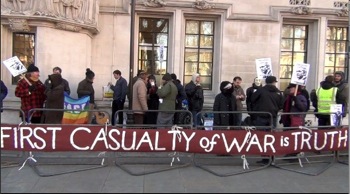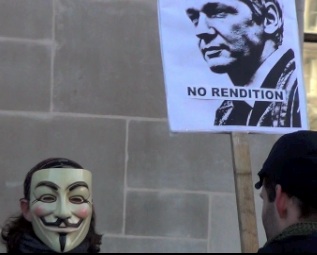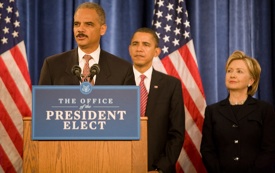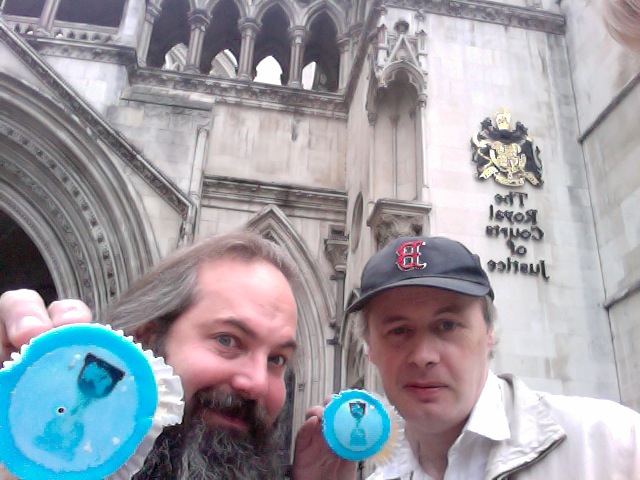


Julian Assange has now been detained for 500 days without charge. This includes the 10 days he spent in solitary confinement on top of the 490 days he's spent electronically tagged under house arrest. After all this time the media is still spreading the same falsities about his case and people continue to attack him with the same misconceptions as they were a year and a half ago.


WikiLeaks News (Releases):
After a public forum on WikiLeaks, Australian Greens Senator Scott Ludlam made the following comment:
The Australian Government has done the absolute bare minimum above stuff-all to help this Australian citizen in trouble. […] They've attempted to block and delay Freedom of Information requests, they haven't answered straight questions, they've voted against motions, and to me it's starting to look not like indifference but like hostility.
This hostility from the Australian Government is becoming more and more apparent, especially as Julian Assange awaits the UK Supreme Court's decision on whether he'll be extradited to Sweden. Not only is the Government offering little support to its citizen, but it is making derogatory and false remarks against the WikiLeaks organization, refusing to offer timely release of relevant information, and passing new laws which make it difficult for WikiLeaks to continue operating legally and raise safety concerns for its founder.



For in-depth coverage of the arraignment, see Alexa O'Brien's transcript and Kevin Gosztola's live-blog.
(Links for further coverage available at the end of this update.)

Expressen's WikiLeaks' "memo" on Carl Bildt: Rolling Stone magazine from January rollingstone.com/politics/news/… #svpol
 During the second and final day of the U.K. Supreme Court's hearings on Julian Assange's extradition, Matrix Chambers attorney Clare Montgomery offered her rebuttal to arguments made yesterday by Assange's counsel. (Dinah Rose is representing Assange in his fight against extradition to Sweden for questioning on sex crime allegations.)
During the second and final day of the U.K. Supreme Court's hearings on Julian Assange's extradition, Matrix Chambers attorney Clare Montgomery offered her rebuttal to arguments made yesterday by Assange's counsel. (Dinah Rose is representing Assange in his fight against extradition to Sweden for questioning on sex crime allegations.)
The week's proceedings have highlighted disparities of law among EU countries and the legal challenges involved in reconciling these conflicts. Assange's case may test the extent to which EU nations can maintain their legal autonomy under the rubric of a unified European system. It may also raise the question: to what degree will EU states have to harmonize their conflicting legal regimes in order to avoid this sort of continued legal wrangling in the future?
Montgomery presented Sweden's case against Assange for about four hours, during which time she appeared to reject EU-wide legal standardization -- essentially arguing that respecting state sovereignty requires preserving the status quo. If it agreed with Montgomery's position, the Court would have to accept significant differences among EU nations in implementing EU-wide legal standards. By contrast, Assange's legal team largely took the position that, while allowing for some variation and inconsistency, the Court should mandate certain universal principles in the extradition process, because of the seriousness of the potential risk that extradition may pose to individual rights.
 At Day 1 of the Julian Assange extradition hearing
At Day 1 of the Julian Assange extradition hearing
On the night before the hearing began, one dedicated Assange supporter in London told me that she planned to arrive at Court by 6 a.m., ahead of the throngs that she expected based on the turnout at Assange's hearing last November. No doubt the freezing February temperatures kept large crowds at home this morning; instead of the masses anticipated, there were only a few orderly lines segregated into cameramen, sign-wielding protesters, and the courtroom audience -- a mix of media representatives, Assange faithfuls, and the curious. I was in the latter line, which was also peppered with a few Occupy London luminaries. During the next hour of collective shivering, I met journalists from all over Europe and the U.S., who now braved frigid weather to witness this historic proceeding. Arriving at around 8:30, one hour before the Court opened to the public, I witnessed the expectant crowd devolve into a chorus of complaints as the early-morning, late-winter wind chill robbed our fingers of almost all feeling.
But, mercifully, 9:30 at last arrived -- as did Assange, soon after. The white-haired WikiLeaks founder offered a spirited hello to the crowd and preceded us into the Court.
At the entry, Court staff had handed out a media briefing, which included the following details:
"Issue: Whether a European Arrest Warrant ('EAW') issued by a public prosecutor is a valid Part I EAW issued by a 'judicial authority' for the purpose and within the meaning of sections 2 and 66 of the Extradition Act 2003.

News
 While speculating about the fate of Julian Assange -- in the face of U.S. wrath over the massive WikiLeaks disclosures of politically-sensitive diplomatic materials -- most media reports have focused on the likelihood of Assange's extradition to the U.S. to face criminal charges. Less discussed, however, is the possibility of irregular rendition, which could pose a far greater threat to Assange's life and safety. Unfortunately for Assange, the key to his fate lies in the hands of his political foil U.S. Secretary of State Hillary Clinton.
While speculating about the fate of Julian Assange -- in the face of U.S. wrath over the massive WikiLeaks disclosures of politically-sensitive diplomatic materials -- most media reports have focused on the likelihood of Assange's extradition to the U.S. to face criminal charges. Less discussed, however, is the possibility of irregular rendition, which could pose a far greater threat to Assange's life and safety. Unfortunately for Assange, the key to his fate lies in the hands of his political foil U.S. Secretary of State Hillary Clinton.
Authored by Bella Magnani
Since the 100-page Swedish police protocol file leaked onto the internet in February 2011, it has been widely known that the SKL (Sweden's national forensic laboratory) failed to find any chromosomal DNA -- either male or female -- on the torn, used condom that Complainant AA gave to police 12 days after the event as evidence of her allegations. For anyone who doubts this fact, it's on page 77 of the police protocol (FUP), attached below [pdf].
Now, at that point -- 25 October, 2010 -- one would hope that a competent and impartial investigations team would turn toward investigating how this forensic finding came about. Sweden takes very seriously the issue of making false claims or presenting false evidence in sex crime cases, which is punishable with a 2-year prison sentence. In this particular case, however, the lead investigation officer, Mats Gehlin, simply asked the SKL to run the test again (page 81 of the FUP). In fairness, the first result does mention a tiny speck that might be "something," which a second test later found to be a very small sample of mitochondrial DNA.
This is significant for two reasons: first, mitochondrial DNA is not uniquely identifying in the same way as chromosomal DNA; and, more importantly, a sample which contains mitochondrial DNA but no chromosomal DNA can only come from hair and nails. And, of course, a used condom should be awash with chromosomal DNA from both participants -- but this one has none.

This is a "WikiLeaks News Update", a daily news update of stories that are obviously related to WikiLeaks and also freedom of information, transparency, cybersecurity, and freedom of expression. All the times are GMT.
The @wikileaks twitter account is constantly being updated with the latest WikiLeaks/Cablegate2 news.
08:40 PM Extraterrestrial life confirmed, by Tajik leader.
05:20 PM Both U.S. Embassy in Tashkent and UNICEF opposed a boycott to child labor in the cotton industry in Uzbeskistan, seemingly in an attempt to keep good relations with the country. Cables show both institutions overlooked NGOs reports regarding exploitation of children, preferring to rely on information from ‘staff of international organizations on the ground in Uzbekistan’.
Despite NGO findings of coercion and intimidation, in a cable dated January 9, 2009, the Embassy still continued to report its belief that child labor was not forced, prefering to use the term "mobilized" versus "forced labor" and that school-children's cotton picking was "an ingrained part of the local culture" and was an "exhausting rite of passage":
"Many students look forward to the annual mobilization to pack their guitars, trail mix-equivalent snacks, vodka (for university students), and head out to the farms. The work can be exhausting, but they make the best of it. Students sometimes have campfires and enjoy evening entertainment, which provide opportunities to mingle with members of the opposite sex more freely than at home."

This is a "WikiLeaks News Update", a daily news update of stories that are obviously related to WikiLeaks and also freedom of information, transparency, cybersecurity, and freedom of expression.
Cablegate2 release
WikiLeaks' full Cablegate archive became available online, primarily due to the negligent publishing of its password in a book authored by Guardian journalist David Leigh.
Now the 251.287 US Embassy cables are also available through WikiLeaks and in searchable format at cables.mrkva.eu.
The whistleblowing organization urges the public to download and mirror the Cablegate2 archive and to continue the disclosure of the important information contained in the cables, by helping Al-Jazeera search the documents and sharing information via twitter using the hashtag #wlfind.

WikiLeaks has released a Statement on the circumstances leading to the disclosure of the archive:
…‘Every day that the corrupt leadership of a country or organization knows of a pending WikiLeaks disclosure is a day spent planning how to crush revolution and reform.

I have to confess that I paid less attention to WikiLeaks over the last couple of months than before. The usual excuses: I had lots of other interesting things to do. Maybe the novelty had worn out. I had definitely also been lulled asleep by the fact that the Netherlands still seems running smoothly and by the assurance that Sweden would not be allowed to extradite without permission from the UK. So it was a rough awakening when I read on the brilliant website SwedenVersusAssange how an extradition would be realized:
http://www.swedenversusassange.com/US-Extradition.html
That fast and that easy!
Authored by Goran Rudling
In the Detention Memorandum (Häktningspromemorian) there is an attachment, “Bilaga – Skäligen misstänkt”, that lists all the sex crimes that Julian Assange is suspected of. It is a long list. It is one rape, one sexual coercion and five sexual molestations. Sofia Wilén is the the alleged victim of rape. According to the police investigation Anna Ardin is supposed to be the victim of six sex crimes.
Theme by Danetsoft and Danang Probo Sayekti inspired by Maksimer